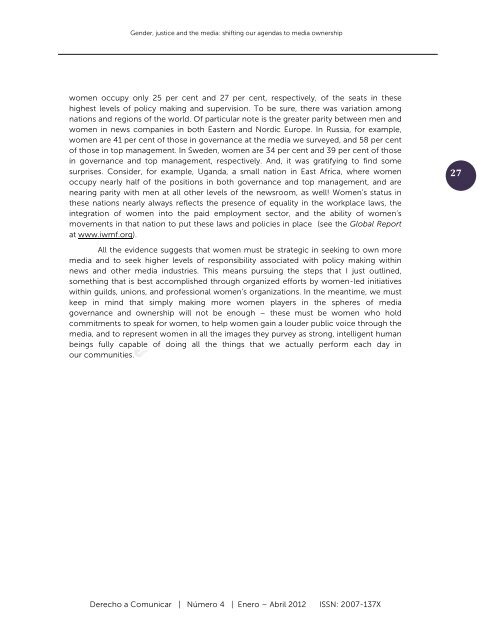- Page 2 and 3: ÍNDICE Número 4 | Enero - Abril 2
- Page 4 and 5: RESEÑA 267| El efecto Al Jazeera J
- Page 6 and 7: PRESENTACIÓN Y aunque han transcur
- Page 8 and 9: Número 4 | Enero - Abril 2012 NETW
- Page 10 and 11: Networks and Power in Gender-orient
- Page 12 and 13: Networks and Power in Gender-orient
- Page 14 and 15: Networks and Power in Gender-orient
- Page 16 and 17: Networks and Power in Gender-orient
- Page 18 and 19: Networks and Power in Gender-orient
- Page 20 and 21: Networks and Power in Gender-orient
- Page 22 and 23: Networks and Power in Gender-orient
- Page 24 and 25: Networks and Power in Gender-orient
- Page 26 and 27: Networks and Power in Gender-orient
- Page 28 and 29: Número 4 | Enero - Abril 2012 GEND
- Page 30 and 31: Gender, justice and the media: shif
- Page 32 and 33: Gender, justice and the media: shif
- Page 36 and 37: Gender, justice and the media: shif
- Page 38 and 39: Gender, justice and the media: shif
- Page 40 and 41: Número 4 | Enero - Abril 2012 LA P
- Page 42 and 43: La propuesta de la hermenéutica fe
- Page 44 and 45: La propuesta de la hermenéutica fe
- Page 46 and 47: La propuesta de la hermenéutica fe
- Page 48 and 49: La propuesta de la hermenéutica fe
- Page 50 and 51: La propuesta de la hermenéutica fe
- Page 52 and 53: La propuesta de la hermenéutica fe
- Page 54 and 55: Mujeres en el periodismo deportivo
- Page 56 and 57: Mujeres en el periodismo deportivo
- Page 58 and 59: Mujeres en el periodismo deportivo
- Page 60 and 61: Mujeres en el periodismo deportivo
- Page 62 and 63: Mujeres en el periodismo deportivo
- Page 64 and 65: Mujeres en el periodismo deportivo
- Page 66 and 67: Mujeres en el periodismo deportivo
- Page 68 and 69: Mujeres en el periodismo deportivo
- Page 70 and 71: Mujeres en el periodismo deportivo
- Page 72 and 73: Mujeres en el periodismo deportivo
- Page 74 and 75: Mujeres en el periodismo deportivo
- Page 76 and 77: Mujeres en el periodismo deportivo
- Page 78 and 79: Los feminismos y las Sociedades de
- Page 80 and 81: Los feminismos y las Sociedades de
- Page 82 and 83: Los feminismos y las Sociedades de
- Page 84 and 85:
Los feminismos y las Sociedades de
- Page 86 and 87:
Los feminismos y las Sociedades de
- Page 88 and 89:
Los feminismos y las Sociedades de
- Page 90 and 91:
Los feminismos y las Sociedades de
- Page 92 and 93:
Los feminismos y las Sociedades de
- Page 94 and 95:
Los feminismos y las Sociedades de
- Page 96 and 97:
Los feminismos y las Sociedades de
- Page 98 and 99:
Los feminismos y las Sociedades de
- Page 100 and 101:
Los feminismos y las Sociedades de
- Page 102 and 103:
Los feminismos y las Sociedades de
- Page 104 and 105:
Los feminismos y las Sociedades de
- Page 106 and 107:
Los feminismos y las Sociedades de
- Page 108 and 109:
Los feminismos y las Sociedades de
- Page 110 and 111:
Número 4 | Enero - Abril 2012 ESTE
- Page 112 and 113:
Estereotipos sexistas en personajes
- Page 114 and 115:
Estereotipos sexistas en personajes
- Page 116 and 117:
Estereotipos sexistas en personajes
- Page 118 and 119:
Estereotipos sexistas en personajes
- Page 120 and 121:
Estereotipos sexistas en personajes
- Page 122 and 123:
Estereotipos sexistas en personajes
- Page 124 and 125:
Estereotipos sexistas en personajes
- Page 126 and 127:
Estereotipos sexistas en personajes
- Page 128 and 129:
Masculinidades: su representación
- Page 130 and 131:
Masculinidades: su representación
- Page 132 and 133:
Masculinidades: su representación
- Page 134 and 135:
Masculinidades: su representación
- Page 136 and 137:
Masculinidades: su representación
- Page 138 and 139:
Masculinidades: su representación
- Page 140 and 141:
Masculinidades: su representación
- Page 142 and 143:
Masculinidades: su representación
- Page 144 and 145:
Masculinidades: su representación
- Page 146 and 147:
Masculinidades: su representación
- Page 148 and 149:
Bella y a la moda, ¿feliz y amada?
- Page 150 and 151:
Bella y a la moda, ¿feliz y amada?
- Page 152 and 153:
Bella y a la moda, ¿feliz y amada?
- Page 154 and 155:
Bella y a la moda, ¿feliz y amada?
- Page 156 and 157:
Bella y a la moda, ¿feliz y amada?
- Page 158 and 159:
Bella y a la moda, ¿feliz y amada?
- Page 160 and 161:
Bella y a la moda, ¿feliz y amada?
- Page 162 and 163:
Número 4 | Enero - Abril 2012 UNA
- Page 164 and 165:
Una mirada a las redacciones. La pr
- Page 166 and 167:
Una mirada a las redacciones. La pr
- Page 168 and 169:
Una mirada a las redacciones. La pr
- Page 170 and 171:
Una mirada a las redacciones. La pr
- Page 172 and 173:
Una mirada a las redacciones. La pr
- Page 174 and 175:
Una mirada a las redacciones. La pr
- Page 176 and 177:
Una mirada a las redacciones. La pr
- Page 178 and 179:
Una mirada a las redacciones. La pr
- Page 180 and 181:
Una mirada a las redacciones. La pr
- Page 182 and 183:
Pensando as relações entre mídia
- Page 184 and 185:
Pensando as relações entre mídia
- Page 186 and 187:
Pensando as relações entre mídia
- Page 188 and 189:
Pensando as relações entre mídia
- Page 190 and 191:
Pensando as relações entre mídia
- Page 192 and 193:
Pensando as relações entre mídia
- Page 194 and 195:
Número 4 | Enero - Abril 2012 MÍD
- Page 196 and 197:
Mídia e relações de gênero nas
- Page 198 and 199:
Mídia e relações de gênero nas
- Page 200 and 201:
Mídia e relações de gênero nas
- Page 202 and 203:
Mídia e relações de gênero nas
- Page 204 and 205:
Mídia e relações de gênero nas
- Page 206 and 207:
Mídia e relações de gênero nas
- Page 208 and 209:
Mídia e relações de gênero nas
- Page 210 and 211:
Mídia e relações de gênero nas
- Page 212 and 213:
Empowering scenes: communication as
- Page 214 and 215:
Empowering scenes: communication as
- Page 216 and 217:
Empowering scenes: communication as
- Page 218 and 219:
Empowering scenes: communication as
- Page 220 and 221:
Empowering scenes: communication as
- Page 222 and 223:
Empowering scenes: communication as
- Page 224 and 225:
Empowering scenes: communication as
- Page 226 and 227:
Disarticulated laughers: backlash i
- Page 228 and 229:
Disarticulated laughers: backlash i
- Page 230 and 231:
Disarticulated laughers: backlash i
- Page 232 and 233:
Disarticulated laughers: backlash i
- Page 234 and 235:
Disarticulated laughers: backlash i
- Page 236 and 237:
Disarticulated laughers: backlash i
- Page 238 and 239:
Disarticulated laughers: backlash i
- Page 240 and 241:
Disarticulated laughers: backlash i
- Page 242 and 243:
Disarticulated laughers: backlash i
- Page 244 and 245:
Número 4 | Enero - Abril 2012 HYPE
- Page 246 and 247:
Hyper-gendered discourse: how Japan
- Page 248 and 249:
Hyper-gendered discourse: how Japan
- Page 250 and 251:
Hyper-gendered discourse: how Japan
- Page 252 and 253:
Hyper-gendered discourse: how Japan
- Page 254 and 255:
Hyper-gendered discourse: how Japan
- Page 256 and 257:
Hyper-gendered discourse: how Japan
- Page 258 and 259:
Hyper-gendered discourse: how Japan
- Page 260 and 261:
Hyper-gendered discourse: how Japan
- Page 262 and 263:
Hyper-gendered discourse: how Japan
- Page 264 and 265:
Hyper-gendered discourse: how Japan
- Page 266 and 267:
Hyper-gendered discourse: how Japan
- Page 268 and 269:
Hyper-gendered discourse: how Japan
- Page 270 and 271:
Hyper-gendered discourse: how Japan
- Page 272 and 273:
Hyper-gendered discourse: how Japan
- Page 274 and 275:
Hyper-gendered discourse: how Japan
- Page 276 and 277:
Hyper-gendered discourse: how Japan
- Page 278 and 279:
Hyper-gendered discourse: how Japan
- Page 280 and 281:
RESEÑA: El efecto Al Jazeera podr
- Page 282 and 283:
RESEÑA: El efecto Al Jazeera monop
- Page 284:
RESEÑA: El efecto Al Jazeera REFER



